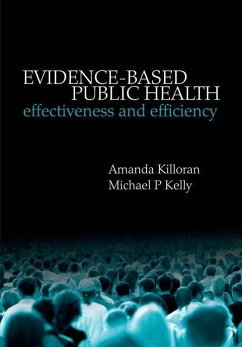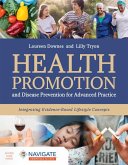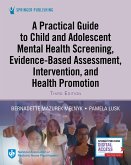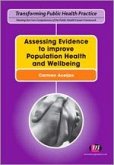Evidence-Based Public Health
Effectiveness and Efficiency
Herausgeber: Killoran, Amanda; Kelly, Mike
Evidence-Based Public Health
Effectiveness and Efficiency
Herausgeber: Killoran, Amanda; Kelly, Mike
- Broschiertes Buch
- Merkliste
- Auf die Merkliste
- Bewerten Bewerten
- Teilen
- Produkt teilen
- Produkterinnerung
- Produkterinnerung
A follow up to Public Health Evidence: Tackling Health Inequalities, this book builds on the themes already introduced, and provides a broader perspective on an evidence-based approach to public health, concentrating on health inequalities.
Andere Kunden interessierten sich auch für
![Evidence-Based Practice for Public Health Emergency Preparedness and Response Evidence-Based Practice for Public Health Emergency Preparedness and Response]() National Academies of Sciences Engineering and MedicineEvidence-Based Practice for Public Health Emergency Preparedness and Response146,99 €
National Academies of Sciences Engineering and MedicineEvidence-Based Practice for Public Health Emergency Preparedness and Response146,99 €![Health Promotion and Disease Prevention for Advanced Practice: Integrating Evidence-Based Lifestyle Concepts Health Promotion and Disease Prevention for Advanced Practice: Integrating Evidence-Based Lifestyle Concepts]() Loureen DownesHealth Promotion and Disease Prevention for Advanced Practice: Integrating Evidence-Based Lifestyle Concepts100,99 €
Loureen DownesHealth Promotion and Disease Prevention for Advanced Practice: Integrating Evidence-Based Lifestyle Concepts100,99 €![Leadership for Evidence-Based Innovation in Nursing and Health Professions Leadership for Evidence-Based Innovation in Nursing and Health Professions]() Daniel WebergLeadership for Evidence-Based Innovation in Nursing and Health Professions91,99 €
Daniel WebergLeadership for Evidence-Based Innovation in Nursing and Health Professions91,99 €![Evidence Based Practice for Health Professionals Evidence Based Practice for Health Professionals]() Bernadette HowlettEvidence Based Practice for Health Professionals119,99 €
Bernadette HowlettEvidence Based Practice for Health Professionals119,99 €![A Practical Guide to Child and Adolescent Mental Health Screening, Evidence-Based Assessment, Intervention, and Health Promotion A Practical Guide to Child and Adolescent Mental Health Screening, Evidence-Based Assessment, Intervention, and Health Promotion]() A Practical Guide to Child and Adolescent Mental Health Screening, Evidence-Based Assessment, Intervention, and Health Promotion104,99 €
A Practical Guide to Child and Adolescent Mental Health Screening, Evidence-Based Assessment, Intervention, and Health Promotion104,99 €![Assessing Evidence to Improve Population Health and Wellbeing Assessing Evidence to Improve Population Health and Wellbeing]() Assessing Evidence to Improve Population Health and Wellbeing51,99 €
Assessing Evidence to Improve Population Health and Wellbeing51,99 €![What Are the Roles of Intercultural Mediators in Health Care and What Is the Evidence on Their Contributions and Effectiveness in Improving Accessibility and Quality of Care for Refugees and Migrants What Are the Roles of Intercultural Mediators in Health Care and What Is the Evidence on Their Contributions and Effectiveness in Improving Accessibility and Quality of Care for Refugees and Migrants]() Centers of Disease ControlWhat Are the Roles of Intercultural Mediators in Health Care and What Is the Evidence on Their Contributions and Effectiveness in Improving Accessibility and Quality of Care for Refugees and Migrants27,99 €
Centers of Disease ControlWhat Are the Roles of Intercultural Mediators in Health Care and What Is the Evidence on Their Contributions and Effectiveness in Improving Accessibility and Quality of Care for Refugees and Migrants27,99 €-
-
-
A follow up to Public Health Evidence: Tackling Health Inequalities, this book builds on the themes already introduced, and provides a broader perspective on an evidence-based approach to public health, concentrating on health inequalities.
Hinweis: Dieser Artikel kann nur an eine deutsche Lieferadresse ausgeliefert werden.
Hinweis: Dieser Artikel kann nur an eine deutsche Lieferadresse ausgeliefert werden.
Produktdetails
- Produktdetails
- Verlag: Oxford University Press, USA
- Seitenzahl: 528
- Erscheinungstermin: 1. Februar 2010
- Englisch
- Abmessung: 245mm x 172mm x 32mm
- Gewicht: 892g
- ISBN-13: 9780199563623
- ISBN-10: 0199563624
- Artikelnr.: 27869436
- Herstellerkennzeichnung
- Libri GmbH
- Europaallee 1
- 36244 Bad Hersfeld
- gpsr@libri.de
- Verlag: Oxford University Press, USA
- Seitenzahl: 528
- Erscheinungstermin: 1. Februar 2010
- Englisch
- Abmessung: 245mm x 172mm x 32mm
- Gewicht: 892g
- ISBN-13: 9780199563623
- ISBN-10: 0199563624
- Artikelnr.: 27869436
- Herstellerkennzeichnung
- Libri GmbH
- Europaallee 1
- 36244 Bad Hersfeld
- gpsr@libri.de
Dr Amanda Killoran is a Public Health Analyst at the Centre for Public Health Excellence at the National Institute for Health and Clinical Excellence. Dr Killoran has worked at national level on public health policy, research and evaluation over many years (previously at the Health Development Agency, and Health Educational Authority). Currently Dr Killoran has technical responsibilities for the development of evidence-based public health guidance covering a wide range of areas (such as sexual health, emotional and social wellbeing of children, spatial planning, and mental wellbeing at work), and contributes to methodological developments relating to review of public health evidence. She is Fellow of the Faculty of Public Health and holds voluntary registration, and also has an honorary lectureship at the London School of Hygiene and Tropical Medicine. Dr Killoran also contributes to national evaluation programmes as a Visiting Fellow in Health Policy Analysis at the King's Fund. Professor Mike Kelly is Director of the Centre of Public Health Excellence at NICE. He originally graduated in Social Science from the University of York, holds a Masters degree in Sociology from the University of Leicester, and undertook his PhD in the Department of Psychiatry in the University of Dundee. Before joining new NICE he was Director of Evidence and Guidance at the Health Development Agency. Professor Kelly has held posts at the Universities of Leicester, Dundee, Glasgow, Greenwich and Abertay. He now has an honorary chair in the Department of Public Health and Policy at the London School of Hygiene and Tropical Medicine, University of London and is a Fellow of the Faculty of Public Health. At NICE Professor Kelly has led the development of the public health portfolio since 2005. This has included the public health guidance on the prevention and management of obesity, behaviour change, maternal and child health, community engagement and physical activity and the environment.
* Part 1 - Public health challenges of the 21st century
* 1: Mel Bartley and David Blane: Trends and scenarios in public health
in the UK
* 2: Catherine Law: Policy and evidence-based public health
* 3: David V McQueen: Ethics and evidence in health promotion
* Part 2 - Evidence-based frameworks
* 4: Ray Pawson and Sanjeev Sridharan: Theory-driven approach -
'programme theories' /'theory of change' concepts
* 5: Hilary Graham and Chris Power: Equity, risk and the life course: a
framework for understanding and tackling health inequalities
* 6: Roger Ingham and Debbie Smith: Vulnerability, disadvantage and
sexual health
* 7: M Judith Lynam: Social context and youth health: understanding and
mitigating exclusion
* 8: Susan Griffin, Mark Sculpher and Nigel Rice: Use of economic
methods to evaluate the cost effectiveness of public health
interventions
* 9: Steve Morris, Nancy Devlin and David Parkin: Equity and
efficiency: the contribution of health economics
* 10: Richard Cookson and Tony Culyer: Valuation of health in public
health in economic evaluations
* 11: Lord Krebbs and Harald Schmidt: Ethics and public health: the
ethics of intervention choices
* Part 3 - Generating evidence
* 12: Peter Craig, Susan Michie, Irwin Nazareth, Professor Paul Dieppe,
Professor Mark Petticrew and Sally Macintyre: Developing and
evaluating complex interventions
* 13: Edward Melhuish, Jay Belsky and Jacqueline Barnes: Child health
and wellbeing in the early years: the national evaluation of Sure
Start
* 14: Robert West and Lion Shahab: Smoking cessation
* 15: Kamlesh Khunti, Thomas Yates, Jacqui Troughton, Margaret Stone
and Melanie Davies: Diabetes-population based prevention programmes
among South Asians
* 16: Lyndal Bond, Helen Butler: The Gatehouse project: a multi-level
integrated approach to promoting wellbeing in schools
* 17: Mika Kivimaki, Jane E Ferrie and Sir Michael Marmot: Workplace
and mental wellbeing - Whitehall 2 Study
* 18: Steve Cummins: Area-based initiatives in deprived neighbourhoods
* 19: Klaus Gebel, Adrian Bauman and Fiona Bull: Built environment -
'walkability' of neighbourhoods
* 20: Anne Ludbrook: Fiscal policy and health-related behaviours
* Part 4 - Synthesising evidence and developing guidance
* 21: Mark Petticrew: Assessing evidence: study quality
* 22: Peter Littlejohns, Kalipso Chalkidou, Jeremy Wyatt and Steven D
Pearson: Assessing evidence and prioritising clinical and public
health guidance recommendations
* 23: Nick Doyle: Social values in developing public health guidance
* 24: Catherine Swann, Lesley Owen, Christopher Carmona, Michael P
Kelly, Clare Wohlgemuth and Jane Huntley: Developing guidance on
changing behaviour
* 25: Amanda Killoran, Antony Morgan and James Jagroo: What works in
promoting the emotional and social well being of children in primary
education?
* 26: Hugo Crombie, Amanda Killoran and Bhash Naidoo: What
environmental measures are effective in promoting physical activity?
* 27: David Barnett, Meindert Boysen, Carole Longson and Andrew
Stevens: Developing evidence based guidance for health technologies:
the NICE experience
* 28: Val Moore, Nick Baillie, Annie Coppel and Julie Royce: Supporting
implementation of public health guidance: NICE experience
* Part 5 - Knowledge, evidence and policy
* 29: Mike Kelly: The individual and social level of public health
* 30: Laurie Anderson: Informing public health policy with the best
available evidence
* 31: Virginia Berridge: Changing policy: reflections on the role of
public health evidence
* 1: Mel Bartley and David Blane: Trends and scenarios in public health
in the UK
* 2: Catherine Law: Policy and evidence-based public health
* 3: David V McQueen: Ethics and evidence in health promotion
* Part 2 - Evidence-based frameworks
* 4: Ray Pawson and Sanjeev Sridharan: Theory-driven approach -
'programme theories' /'theory of change' concepts
* 5: Hilary Graham and Chris Power: Equity, risk and the life course: a
framework for understanding and tackling health inequalities
* 6: Roger Ingham and Debbie Smith: Vulnerability, disadvantage and
sexual health
* 7: M Judith Lynam: Social context and youth health: understanding and
mitigating exclusion
* 8: Susan Griffin, Mark Sculpher and Nigel Rice: Use of economic
methods to evaluate the cost effectiveness of public health
interventions
* 9: Steve Morris, Nancy Devlin and David Parkin: Equity and
efficiency: the contribution of health economics
* 10: Richard Cookson and Tony Culyer: Valuation of health in public
health in economic evaluations
* 11: Lord Krebbs and Harald Schmidt: Ethics and public health: the
ethics of intervention choices
* Part 3 - Generating evidence
* 12: Peter Craig, Susan Michie, Irwin Nazareth, Professor Paul Dieppe,
Professor Mark Petticrew and Sally Macintyre: Developing and
evaluating complex interventions
* 13: Edward Melhuish, Jay Belsky and Jacqueline Barnes: Child health
and wellbeing in the early years: the national evaluation of Sure
Start
* 14: Robert West and Lion Shahab: Smoking cessation
* 15: Kamlesh Khunti, Thomas Yates, Jacqui Troughton, Margaret Stone
and Melanie Davies: Diabetes-population based prevention programmes
among South Asians
* 16: Lyndal Bond, Helen Butler: The Gatehouse project: a multi-level
integrated approach to promoting wellbeing in schools
* 17: Mika Kivimaki, Jane E Ferrie and Sir Michael Marmot: Workplace
and mental wellbeing - Whitehall 2 Study
* 18: Steve Cummins: Area-based initiatives in deprived neighbourhoods
* 19: Klaus Gebel, Adrian Bauman and Fiona Bull: Built environment -
'walkability' of neighbourhoods
* 20: Anne Ludbrook: Fiscal policy and health-related behaviours
* Part 4 - Synthesising evidence and developing guidance
* 21: Mark Petticrew: Assessing evidence: study quality
* 22: Peter Littlejohns, Kalipso Chalkidou, Jeremy Wyatt and Steven D
Pearson: Assessing evidence and prioritising clinical and public
health guidance recommendations
* 23: Nick Doyle: Social values in developing public health guidance
* 24: Catherine Swann, Lesley Owen, Christopher Carmona, Michael P
Kelly, Clare Wohlgemuth and Jane Huntley: Developing guidance on
changing behaviour
* 25: Amanda Killoran, Antony Morgan and James Jagroo: What works in
promoting the emotional and social well being of children in primary
education?
* 26: Hugo Crombie, Amanda Killoran and Bhash Naidoo: What
environmental measures are effective in promoting physical activity?
* 27: David Barnett, Meindert Boysen, Carole Longson and Andrew
Stevens: Developing evidence based guidance for health technologies:
the NICE experience
* 28: Val Moore, Nick Baillie, Annie Coppel and Julie Royce: Supporting
implementation of public health guidance: NICE experience
* Part 5 - Knowledge, evidence and policy
* 29: Mike Kelly: The individual and social level of public health
* 30: Laurie Anderson: Informing public health policy with the best
available evidence
* 31: Virginia Berridge: Changing policy: reflections on the role of
public health evidence
* Part 1 - Public health challenges of the 21st century
* 1: Mel Bartley and David Blane: Trends and scenarios in public health
in the UK
* 2: Catherine Law: Policy and evidence-based public health
* 3: David V McQueen: Ethics and evidence in health promotion
* Part 2 - Evidence-based frameworks
* 4: Ray Pawson and Sanjeev Sridharan: Theory-driven approach -
'programme theories' /'theory of change' concepts
* 5: Hilary Graham and Chris Power: Equity, risk and the life course: a
framework for understanding and tackling health inequalities
* 6: Roger Ingham and Debbie Smith: Vulnerability, disadvantage and
sexual health
* 7: M Judith Lynam: Social context and youth health: understanding and
mitigating exclusion
* 8: Susan Griffin, Mark Sculpher and Nigel Rice: Use of economic
methods to evaluate the cost effectiveness of public health
interventions
* 9: Steve Morris, Nancy Devlin and David Parkin: Equity and
efficiency: the contribution of health economics
* 10: Richard Cookson and Tony Culyer: Valuation of health in public
health in economic evaluations
* 11: Lord Krebbs and Harald Schmidt: Ethics and public health: the
ethics of intervention choices
* Part 3 - Generating evidence
* 12: Peter Craig, Susan Michie, Irwin Nazareth, Professor Paul Dieppe,
Professor Mark Petticrew and Sally Macintyre: Developing and
evaluating complex interventions
* 13: Edward Melhuish, Jay Belsky and Jacqueline Barnes: Child health
and wellbeing in the early years: the national evaluation of Sure
Start
* 14: Robert West and Lion Shahab: Smoking cessation
* 15: Kamlesh Khunti, Thomas Yates, Jacqui Troughton, Margaret Stone
and Melanie Davies: Diabetes-population based prevention programmes
among South Asians
* 16: Lyndal Bond, Helen Butler: The Gatehouse project: a multi-level
integrated approach to promoting wellbeing in schools
* 17: Mika Kivimaki, Jane E Ferrie and Sir Michael Marmot: Workplace
and mental wellbeing - Whitehall 2 Study
* 18: Steve Cummins: Area-based initiatives in deprived neighbourhoods
* 19: Klaus Gebel, Adrian Bauman and Fiona Bull: Built environment -
'walkability' of neighbourhoods
* 20: Anne Ludbrook: Fiscal policy and health-related behaviours
* Part 4 - Synthesising evidence and developing guidance
* 21: Mark Petticrew: Assessing evidence: study quality
* 22: Peter Littlejohns, Kalipso Chalkidou, Jeremy Wyatt and Steven D
Pearson: Assessing evidence and prioritising clinical and public
health guidance recommendations
* 23: Nick Doyle: Social values in developing public health guidance
* 24: Catherine Swann, Lesley Owen, Christopher Carmona, Michael P
Kelly, Clare Wohlgemuth and Jane Huntley: Developing guidance on
changing behaviour
* 25: Amanda Killoran, Antony Morgan and James Jagroo: What works in
promoting the emotional and social well being of children in primary
education?
* 26: Hugo Crombie, Amanda Killoran and Bhash Naidoo: What
environmental measures are effective in promoting physical activity?
* 27: David Barnett, Meindert Boysen, Carole Longson and Andrew
Stevens: Developing evidence based guidance for health technologies:
the NICE experience
* 28: Val Moore, Nick Baillie, Annie Coppel and Julie Royce: Supporting
implementation of public health guidance: NICE experience
* Part 5 - Knowledge, evidence and policy
* 29: Mike Kelly: The individual and social level of public health
* 30: Laurie Anderson: Informing public health policy with the best
available evidence
* 31: Virginia Berridge: Changing policy: reflections on the role of
public health evidence
* 1: Mel Bartley and David Blane: Trends and scenarios in public health
in the UK
* 2: Catherine Law: Policy and evidence-based public health
* 3: David V McQueen: Ethics and evidence in health promotion
* Part 2 - Evidence-based frameworks
* 4: Ray Pawson and Sanjeev Sridharan: Theory-driven approach -
'programme theories' /'theory of change' concepts
* 5: Hilary Graham and Chris Power: Equity, risk and the life course: a
framework for understanding and tackling health inequalities
* 6: Roger Ingham and Debbie Smith: Vulnerability, disadvantage and
sexual health
* 7: M Judith Lynam: Social context and youth health: understanding and
mitigating exclusion
* 8: Susan Griffin, Mark Sculpher and Nigel Rice: Use of economic
methods to evaluate the cost effectiveness of public health
interventions
* 9: Steve Morris, Nancy Devlin and David Parkin: Equity and
efficiency: the contribution of health economics
* 10: Richard Cookson and Tony Culyer: Valuation of health in public
health in economic evaluations
* 11: Lord Krebbs and Harald Schmidt: Ethics and public health: the
ethics of intervention choices
* Part 3 - Generating evidence
* 12: Peter Craig, Susan Michie, Irwin Nazareth, Professor Paul Dieppe,
Professor Mark Petticrew and Sally Macintyre: Developing and
evaluating complex interventions
* 13: Edward Melhuish, Jay Belsky and Jacqueline Barnes: Child health
and wellbeing in the early years: the national evaluation of Sure
Start
* 14: Robert West and Lion Shahab: Smoking cessation
* 15: Kamlesh Khunti, Thomas Yates, Jacqui Troughton, Margaret Stone
and Melanie Davies: Diabetes-population based prevention programmes
among South Asians
* 16: Lyndal Bond, Helen Butler: The Gatehouse project: a multi-level
integrated approach to promoting wellbeing in schools
* 17: Mika Kivimaki, Jane E Ferrie and Sir Michael Marmot: Workplace
and mental wellbeing - Whitehall 2 Study
* 18: Steve Cummins: Area-based initiatives in deprived neighbourhoods
* 19: Klaus Gebel, Adrian Bauman and Fiona Bull: Built environment -
'walkability' of neighbourhoods
* 20: Anne Ludbrook: Fiscal policy and health-related behaviours
* Part 4 - Synthesising evidence and developing guidance
* 21: Mark Petticrew: Assessing evidence: study quality
* 22: Peter Littlejohns, Kalipso Chalkidou, Jeremy Wyatt and Steven D
Pearson: Assessing evidence and prioritising clinical and public
health guidance recommendations
* 23: Nick Doyle: Social values in developing public health guidance
* 24: Catherine Swann, Lesley Owen, Christopher Carmona, Michael P
Kelly, Clare Wohlgemuth and Jane Huntley: Developing guidance on
changing behaviour
* 25: Amanda Killoran, Antony Morgan and James Jagroo: What works in
promoting the emotional and social well being of children in primary
education?
* 26: Hugo Crombie, Amanda Killoran and Bhash Naidoo: What
environmental measures are effective in promoting physical activity?
* 27: David Barnett, Meindert Boysen, Carole Longson and Andrew
Stevens: Developing evidence based guidance for health technologies:
the NICE experience
* 28: Val Moore, Nick Baillie, Annie Coppel and Julie Royce: Supporting
implementation of public health guidance: NICE experience
* Part 5 - Knowledge, evidence and policy
* 29: Mike Kelly: The individual and social level of public health
* 30: Laurie Anderson: Informing public health policy with the best
available evidence
* 31: Virginia Berridge: Changing policy: reflections on the role of
public health evidence








